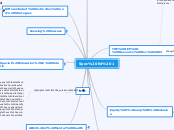Spec Ed 1
Differentiated Instruction and Strategies
Differentiation Brochure
Differentiated Instruction Educator’s Package (2010)
OISE Differentiation
Growing Success
Special Education in Ontario
IPRC
Highlights of Regulation 181/98
The Education Act requires that school boards provide, or purchase from another board, special education programs and services for their exceptional pupils. This website provides information about the Identification, Placement, and Review Committee (IPRC), and sets out the procedures involved in identifying a pupil as “exceptional”, deciding the pupil’s placement, or appealing such decisions when the parent does not agree with the IPRC.
ABCs of Mental Health
Programming, Assessment and Evaluation
Learning for All
Education for All
Program and Policy Memoranda related to Special Education
(PPM’s 1, 8, 11, 59, 76C, 81, 85, 127, 140, 156)
Ontario Secondary School Diploma pg12
1. What was your prior knowledge of the documents you just read? Do you have a better understanding of those documents now?
2. What is the significance of these documents for students with special needs?
3. Looking at the topics for this Module only, consider one question that you would like to have answered directly related to Module 3 topics only. You might choose to capture your thoughts in your Learning Journal for future reference.
THE IEP - Resource Doc 2004
Sample IEPs from eduGains
Strengths & Needs
General Skills that could be a strength or a need•Advanced writing skills•Auditory processing skills•Conflict resolution skills•Cooperation skills•Creativity skills•Fine motor skills•Goal setting skills•Gross motor skills•Information management skills•Initiative skills•Problem solving skills•Self-help skills•Self-regulatory skills•Visual processing skills
Program Support Skills that could be a strength or need•Auditory discrimination skills•Auditory memory skills•Basic life skills•Cognitive understanding skills•Communication skills•Computer skills•Expressive language skills (speaking)•Expressive language skills (writing)•Keyboarding skills•Literacy skills•Memory skills•Numeracy skills•Problem-solving skills•receptive language skills (comprehension and decoding)•Receptive language skills (reading and listening)•Receptive language skills (reading)•Visual acuity skills•Visual figure ground skills•Visual memory skills
Responsibility/ Learning Skills that could be a strength or need•Attendance skills•Independent work skills•Organizational skills•Perseverance skills•Punctionality skills•Task-completion skills•Time management skills
Behaviour Skills that could be a strength or need•Anger-management skills•Attention skills•Self-control skills•Social skills
Learning Style (Strength only)•Auditory learner skills•Kinesthetic learning style skills•Tactile learner skills•Visual learner skills
Gifted Identification skills that would generally only be strengths •Critical thinking skills•Divergent thinking skills•Problem-solving skills•Reasoning skills•Abstract thinking skills•Advanced interpersonal skills (expression and reception of opinions and beliefs)•Cognitive ability in (subject)•Creative problem solving skills•General cognitive ability•Leadership skills•Original thinking skills•Research skills and technical proficiency for accessing and presenting information
